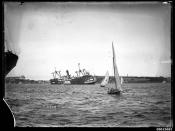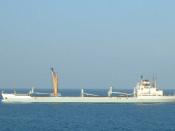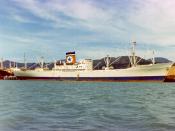IntroductionAccording to IMO (2005), there is a bulk fleet of over 46,222 consisting of general cargo ships, bulk carriers, tankers, passenger ships, containerships, and various specialist vessels trading around the world on general & bulk cargoes that are mainly manufactures products, agricultural products, fuels and mining products.
General cargo is a term which covers a great variety of goods. Those goods may be in bags, cases, crates, drums or barrels, or they may be kept together in bales. They could be individual parcels, castings or machinery parts, earthenware or confectionary. They all come under the collective term of 'general cargo'. The term 'bulk' is used to describe commodities such as crude oil, grain, iron ore and coal whose homogeneous physical character lends itself to move in huge quantities in bulk handling & transport. Under this definition, cargoes such as refrigerated meat, chilled foods, motor cars, live animals, and logs are also classified as bulk cargoes.
Hence, bulk cargo vessels have become bigger and more specialized in an effort to establish competitive and efficient cargo handling tools for specific industries & markets (Christopher 2001).
The physical character of each commodity determines the type of ships used & the type of cargo handling gear required. Proper shipboard cargo handling equipments are built to handle these different types of products, which are further defined by the manner they're packaged under the most common form of packaging like breakbulk, unitised & containerized. Cargo handling efficiency can be achieved by packing non-standard items into standard units like ores, fertilizers, cement & rice into large bag & stacks onto pallets which give greater handling efficiency.
Cargoes on General/Multi-purpose ships & Ro-Ro shipsThe ship is a capital asset that will carry whatever cargo yields the greatest profits; obviously, the more different types of cargo it...


